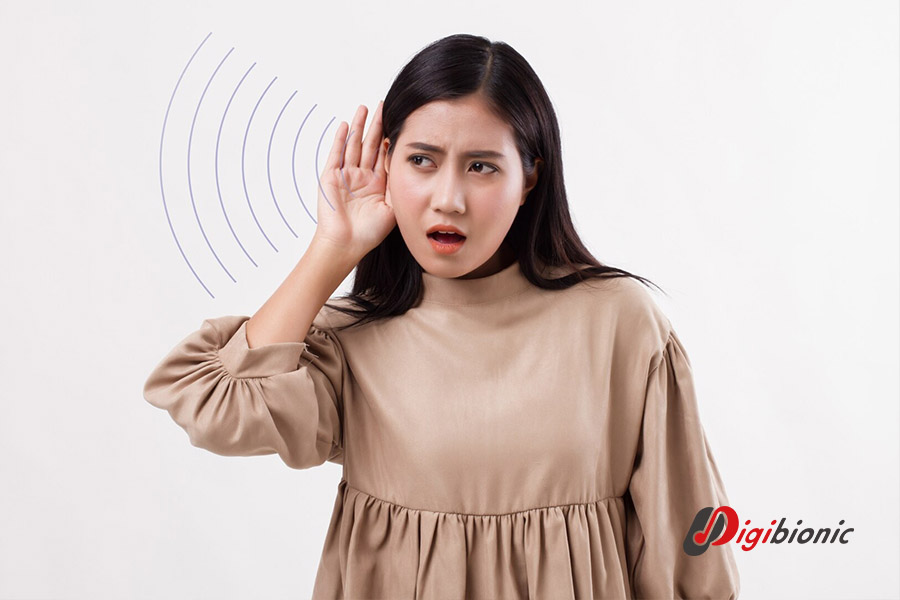
Tinnitus refers to a condition in which the ability to perceive sound decreases, resulting in reduced sound clarity. Some individuals may also experience noises in the ear, such as ringing, buzzing, or whistling sounds. Most people with tinnitus are aware of it because the condition often occurs suddenly and can be quite bothersome. However, some may not notice it at first, as the symptoms develop gradually. It may become apparent through the observations of others — for example, when someone calls them but they don’t respond, or when they tend to turn up the volume on music or the television, or speak louder than usual.

Tinnitus is a sound perceived in the ear without any external sound source. It has a prevalence rate of around 15%, meaning that anyone may experience tinnitus at some point in their life.
The causes of tinnitus are generally divided into two types:
Objective tinnitus — a type of tinnitus that can be heard by others as well.
The cause is usually related to musculoskeletal or vascular disorders.
Subjective tinnitus — a type of tinnitus that can only be heard by the patient.
The causes include diseases of the outer, middle, or inner ear, auditory nerve pathway disorders, and brain membrane diseases.
An otolaryngologist (ENT specialist) will perform a thorough examination of the ears, nose, head, and neck, along with hearing tests, brainwave tests, ultrasound imaging of intracranial and extracranial blood vessels, and blood tests to identify the underlying cause.
Studies show that approximately 90% of patients with tinnitus also experience some degree of hearing loss. This type of tinnitus is often associated with systemic conditions such as hypertension, diabetes, thyroid disorders, and hyperlipidemia. Once these conditions are properly managed, tinnitus symptoms often improve as well.
Another common cause is neurological tinnitus, which originates from the inner ear or auditory nerve degeneration. Neurological causes include head trauma, certain medications or chemicals, prolonged noise exposure, sudden deafness, Ménière’s disease, and aging.
However, some patients with normal hearing and no structural abnormalities may still experience tinnitus due to factors such as insomnia, stress, irregular work–rest patterns, or common colds. These conditions can cause tension in the brain’s reticular formation and limbic system.
If tinnitus persists for more than five minutes at a time, occurs more than once a week, or is noticeable even in noisy environments, it may be a warning sign of an underlying health issue. In such cases, it is essential to consult a doctor for proper evaluation and diagnosis.

Hearing Aids as an Effective Way to Manage Chronic Tinnitus
Most modern digital hearing aids include a “tinnitus management function”, a built-in program designed to help reduce the perception of tinnitus and bring relief to those who experience constant ringing or buzzing in the ears.
A digital hearing aid is a device calibrated to match the user’s specific hearing needs. It processes sound through multiple channels, allowing for high-resolution, clear, and natural sound quality—far superior to traditional analog models. These devices are fine-tuned using computer software, enabling precise sound customization, speech enhancement, and noise reduction according to the user’s lifestyle and preferences.
Additionally, digital hearing aids can effectively minimize environmental noise, improving listening comfort in various situations.
Digital hearing aids enhance hearing performance and help reduce the perception of tinnitus. With the tinnitus function feature, you can:
Activate the tinnitus masker to cover up the ringing or buzzing sound in your ears.
Select masking sounds that closely match the tone or pitch of your tinnitus.
Adjust the masking volume to suit your comfort level and personalize the experience.
Over time, this process helps your brain adapt and reduce its sensitivity to the tinnitus sound, making it less noticeable in daily life.
Tinnitus can significantly interfere with hearing and overall quality of life. Using a hearing aid that enhances hearing performance while managing tinnitus symptoms can make daily communication easier, improve concentration, and restore comfort in quiet environments.
Let people experience the beauty of hearing aids and hear the sounds of their family’s love once again.
If you wish to share that love with Digibionic, please contact us…

Head Office 3,5 ถนนสุทธิสารวินิจฉัย แขวงสามเสนใน เขตพญาไท กรุงเทพมหานคร 10400
เปิดทำการวันจันทร์-วันเสาร์ 09:00-18:00 น.
สำรองคิวล่วงหน้าหากต้องการมาในวันอาทิตย์
copyright © digibionic 2023 all rights reserved
เราใช้คุกกี้เพื่อพัฒนาประสิทธิภาพ และประสบการณ์ที่ดีในการใช้เว็บไซต์ของคุณ คุณสามารถศึกษารายละเอียดได้ที่ นโยบายความเป็นส่วนตัว และสามารถจัดการความเป็นส่วนตัวเองได้ของคุณได้เองโดยคลิกที่ ตั้งค่า